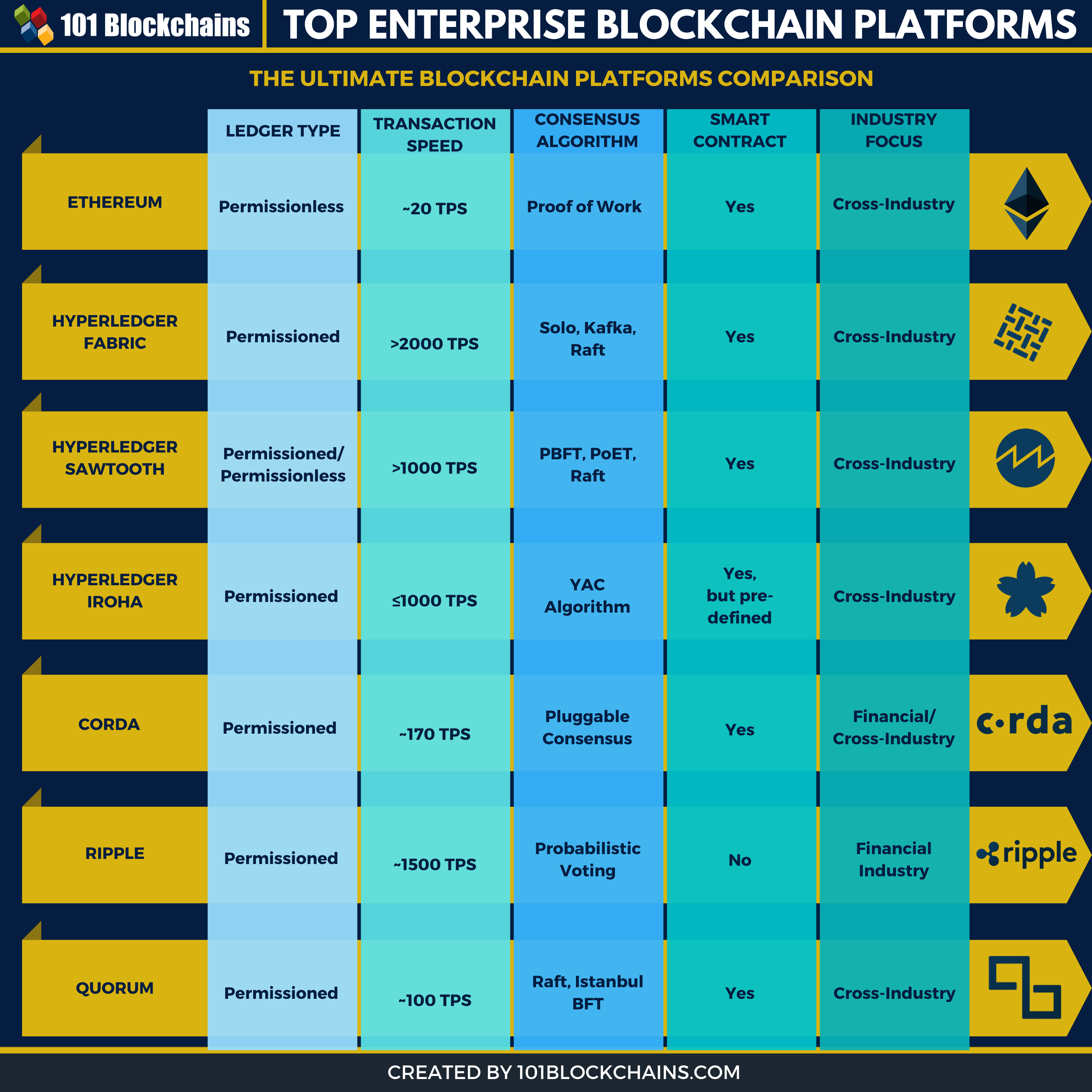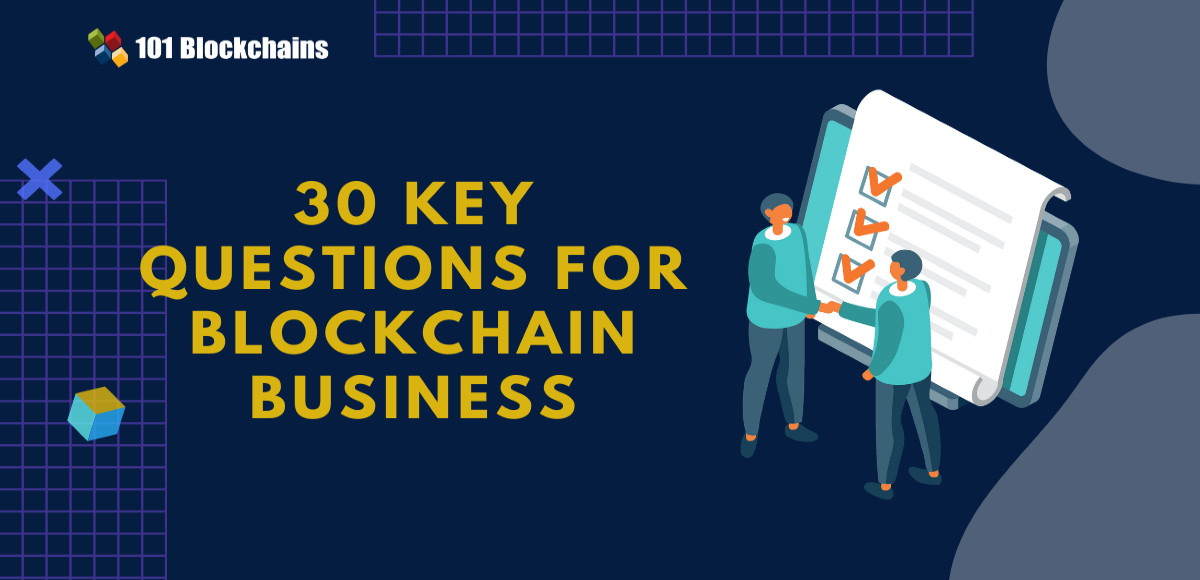Learn how blockchain truly works, master key definitions, and uncover what makes smart contracts so "smart." Dive into the fundamentals, gain valuable insights, and start your blockchain journey today!

- Opinions
Hasib Anwar
- on June 03, 2020
Best Blockchain Platforms For Enterprises
Blockchain platforms are vital for making blockchain technology available to enterprises. In reality, these blockchain platforms actually save a lot of time and resources. But how do they do it?
Well, if you are going to work on your blockchain solution and have to make the platform from scratch, it will undoubtedly take a lot of time, won’t it? But with the help of these platforms, you can now have a base for your own needs.
Most of these platforms offer customization, and you can do that to add up your features to the platform. So, in the long run, all the platforms in the blockchain platforms list will save you a lot of money and time.
Thus, to help you find your desired platform, I’ve put together a blockchain platforms list. More so, you will also get a blockchain platforms comparison once I’ve covered all the platforms. But before everything else, I’ll briefly explain what is a blockchain platform.
Build your identity as a certified blockchain expert with 101 Blockchains’ Blockchain Certifications designed to provide enhanced career prospects.
What Is a Blockchain Platform?
First of all, let’s start with one of the most fundamental questions you have on your mind – “what is a blockchain platform?” Typically, blockchain platforms are distributed structured platforms that aids in the development of decentralized applications.
More so, these platforms can be both permissionless and permissioned. Some of the few popular ones in the market are Hyperledger, Corda, Ethereum, etc.
They all have blockchain platforms that you can use to make your very own personal blockchain solutions. Also, there are many different types of platforms for various industries. All of them have different outputs, as well. Just make sure you pick the one that most suited for your company and industry.
No, you know what is a blockchain platform. To help you find the best platform, I’ve put together a list of criteria that you should consider.
How to Select the Perfect Blockchain Platform?
There are some criteria that you should follow in selecting a platform for your company. These criteria are critical because then you can make a comparison of blockchain platforms and see how they perform in each segment.
This will definitely help you decide which one to pick up. Anyway, let’s check out all the criteria one by one.
Is the Platform Fully Developed or Still in Development Stage?
This is a huge issue when it comes to selecting the perfect blockchain platform. Why though? Well, because if you choose a platform that stills under development, it won’t offer you the full potential you want.
Also, another thing is that you don’t want to use a platform that’s been deprecated as well. So, if the developers have stopped adding updates or fixing errors, that platform is troublesome.
Therefore, you should check out what stage the platform is. For this, you can use GitHub or their official website or so on. Basically, just make sure the platform you choose is fully developed, tested many times, and ready for use.
What Kind of Blockchain Do you Need?
The issue is that the type of blockchain you’ll need will solely be based on your solution. You may have several blockchain solutions on your list, and they may require different types of blockchain to function.
But before you know what type of blockchain you need, you have to learn about these types at the very start. Thus, try to take a blockchain course that will help you understand the concepts better.
To help you out, we have a lot of blockchain certification and courses that offer the best of the best information on the said topic. Anyhow, once you figure out whether private, public, or federated platforms are right for you, you can filter out your favorites.
What Programming Languages Does Platform Support?
Yes, programming languages do matter when it comes to choosing the perfect platform for your solution. As blockchain is a new technology, many other modern programming languages are being introduced.
And so, finding the perfect development team with a proficiency in that language may be severe. Also, in many cases, the different programming languages can pose a threat if you want to integrate it into your existing legacy networks.
Therefore, make sure you know what kind of programming language the platform supports or what kind of SDK you will need to use that platform.
Once you understand what your team can pull off, you can select the platform based on that.
Is the Platform Popular?
The popularity of the platform also matters a lot. In any case, there are many blockchain technology platforms in the market. But not all of them have the full potential to pull off an enterprise solution output.
In fact, the increasing number of blockchain platforms is quite exhausting. Everyone is now trying to build one for themselves without considering the platform’s quality.
For enterprise use cases, you will need a platform that is trusted and comes from a famous brand. More so, you have to make sure that the platform is fully capable of safeguarding all of your company’s information.
Thus, always make sure to choose the platforms that are currently popular in the market, and other people are already using it. More so, make sure that the developer team has behind it has a reputation as well.
Start your blockchain journey Now with the Enterprise Blockchains Fundamentals
What Kind of Consensus Method Does the Platform Use?
It can be quite challenging to use a platform if you don’t know what kind of consensus protocol that platform uses or supports. In reality, a blockchain platform may support multiple consensus methods such as Hyperledger Fabric, Sawtooth, etc.
More so, this type of platform has a modular structure, and the best blockchain platforms offer more customizability.
Remember that some of the consensus protocols are power hungry, so they can take up a lot of resources. Also, going for a BFT consensus algorithm is the best-case scenario here. If you want to learn more about the consensus protocols, make sure to check out our blockchain courses for that.
Does the Platform Offers Smart Contract Feature?
Well, not every single blockchain platforms offer a smart contract feature. The issue is that does your solution really need smart contracts in the first place. In reality, the use of smart contracts is extremely useful in an enterprise environment because it does automate a lot of contracts.
Also, the usefulness of this feature is huge, and I can understand if you are tempted to add it to your solution even if you don’t need it. But it will only take up resources without any usefulness.
So, if you truly need the feature, just make sure to select a platform that offers it. It’s a very complicated feature as well, so not all the platforms can pull it off in a similar or efficient tone.
You can use our blockchain platforms comparison table to figure that out as well.
Curious to understand the complete smart contract development lifecycle? Enroll in Smart Contracts Development Course Now!
Does Your Blockchain Solution Need Scalability? If So, How Much?
Well, scalability is a huge issue when it comes down to blockchain. In reality, the public blockchain seems to be far behind in their filed. In reality, as they are open for all, it takes up a lot of resources and drastically slows down the system.
Therefore, they are far away from being scalable. If you are not looking for scalability, then using a public blockchain can help as well.
If you really need it, make sure to choose a platform that is easy to scale. For example, many private or federated platforms are scalable, but the level of it seems to vary a lot.
Review your solution once again and make sure to select a platform that is capable of handling all your needs.
8 Best Blockchain Platforms
Please include attribution to 101blockchains.com with this graphic. <a href='https://101blockchains.com/blockchain-infographics/'> <img src='https://101blockchains.com/wp-content/uploads/2020/06/blockchain-platforms.png' alt='blockchain platforms='0' /> </a>
Now, to help you with your blockchain journey, I’ve handpicked 8 best platforms that you use in your distributed ledger solutions. So, let’s see what these are, shall we?
Ethereum
Ledger Type: Permissionless
Consensus Algorithm: Proof of Work
Smart Contract: Yes
Ethereum is one of the open source blockchain platforms on our list. To be frank, it’s one of the best blockchain platforms in the market right now. Even though it’s permissionless and definitely comes with its own set of issues, still Ethereum manages to prevail for a very long time.
Ethereum became live in 2015, and from that time, it gained massive popularity. It comes with its native cryptocurrency, Ether, and Gas. Obviously, in this platform, anyone can join in and participate in the consensus process.
So, if your blockchain solution really needs an open environment, then going for Ethereum can be the best bet.
Also, this platform runs in Proof of Work, which is actually quite a power-hungry consensus. More so, it doesn’t offer any private transaction options.
But if you are really interested in Ethereum for your enterprise, then you can use their private version as well. The Ethereum Enterprise Alliance is responsible for this private version of Ethereum.
In reality, this version comes with all the benefits of the public blockchain with added privacy in the mix. Also, it will grow alongside the public version and vise versa.
The best part about this platform is that it combines both private and public technology to give you the ultimate output.
Even though it still kind of falls behind on the transaction per second criteria.
Want to learn the fundamentals of Ethereum development? Enroll Now: Ethereum Development Fundamentals
Hyperledger Fabric
Ledger Type: Permissioned
Consensus Algorithm: Solo, Kafka, Raft
Smart Contract: Yes
Hyperledger Fabric is here to change the industry for good. In reality, it’s one of the best blockchain platforms in the market right now. It’s also a great one in the open source blockchain platforms list we have. So, you can expect to get access to its code for free, and you won’t need to pay anything for that.
The Fabric came to be in 2015 after Ethereum and is the product of the Hyperledger Project. Hyperledger is actually an umbrella project or consortium of sorts where they develop blockchain in order to make it accessible for everyone.
If you are interested in a blockchain platform that is permissioned and can go with any kind of industry, then Fabric is really a great pick.
Anyhow, Hyperledger Fabric comes with a strong architectural model with a modular structure. It means that you can plug in any kind of feature and use it. Therefore, it’s extremely customizable.
More so, it uses a less power-hungry consensus algorithm to reach an agreement. Also, it offers scalability and doesn’t slow down when there are many participants in the platform.
In reality, it offers smart contracts, but it’s called chaincode here.
Want to learn the basic and advanced concepts of Blockchain and Hyperledger Fabric? Enroll Now: Getting Started with Hyperledger Fabric
Hyperledger Sawtooth
Ledger Type: Permissioned/Permissionless
Consensus Algorithm: PBFT, PoET, Raft
Smart Contract: Yes
Hyperledger Sawtooth is another great addition to our open source blockchain platforms list. In reality, it’s also another production of Linux Foundation and Intel contributed highly in it. Using it is completely free, and you can get the codes directly from GitHub.
Also, you can use this platform in any kind of industry because the developers designed the architecture that way. In reality, this platform is also extremely customizable.
It’s actually an enterprise-class platform that is modular and designed to deploy, create, and execute distributed ledger technologies.
You must be wondering – what is the main difference between Sawtooth and Fabric?
Well, it’s actually the type of ledger is where they are different. Fabric is a fully permissioned platform; on the other hand, you can use Sawtooth as permissioned and permissionless both. Furthermore, there are other factors as well, and you can see them in the blockchain platforms comparison table later.
If you want a platform that is really easy to integrate, then you should go for Sawtooth. Also, another great feature of Sawtooth is that it uses a different algorithm Proof of Elapsed Time that is much more advanced than Raft.
Hyperledger Iroha
Ledger Type: Permissioned
Consensus Algorithm: YAC (Yet Another Consensus) Algorithm
Smart Contract: Yes, but pre-defined
Hyperledger Iroha is also quite a popular blockchain platform. It’s also one of the open source blockchain platforms that offer good value. In reality, Iroha is actually quite easy to use and designed that way.
If you feel like other platforms are difficult to control or learn about, then you can check out this one. In reality, it’s mainly for helping enterprise companies build secured, trusted, and fast applications on top of it.
Anyhow, the underlying structure is quite simple, and it’s modular obviously. It uses a completely different consensus algorithm called Yet Another Consensus (YAC) algorithm. In reality, this protocol is extremely fast and secured.
However, it does have a slight limitation in terms of smart contracts. Well, it does offer smart contracts like feature, but it comes with pre-defined contract templates rather than fully customizable ones.
So, you can still use it, but you can’t customize it as you want.
But overall, it’s a good platform, and many companies are already using it.
Ripple
Ledger Type: Permissioned
Consensus Algorithm: Probabilistic Voting
Smart Contract: No
Ripple is a great addition to our blockchain platforms list. Well, Ripple started their journey way back in 2012, but then it was named Opencoin. Anyhow, later in 2015, they finally renamed it, Ripple. In reality, Ripple is mainly suited for financial companies.
As a matter of fact, they actually wanted to connect all the banks, corporations, payment providers, and asset exchanges under the same network.
Anyhow, Ripple offers RippleNet, which is a global free transaction platform. You can use this platform to make payment anywhere, anytime in the world. More so, it really changes the way we see banking at present.
Do you know how much it will take to process your transaction in Ripple? Only 4 seconds! Using Ripple, you can get access to new marketplaces, get more customers, have greater security, and have a micropayment system.
Anyhow, if you are an enterprise company that is working on a financial solution, then you should definitely check it out.
Quorum
Ledger Type: Permissioned
Consensus Algorithm: Raft, Istanbul Byzantine Fault Tolerance
Smart Contract: Yes
Quorum is another great platform on this 8 best blockchain platforms list. In reality, Quorum is actually an inspiration from Ethereum Network. J.P. Morgan is behind the development of Quorum, and he used Ethereum as the base to design it.
However, it’s not permissionless like Ethereum; rather, it’s permissioned. In reality, the platform is for ensuring that you get a high-speed and high-throughput in any environment. More so, it is scalable, but it does have its limitations as well.
Unlike Ethereum, Quorum uses a light consensus process to reach an agreement. More so, this saves a lot of resources in the long run.
The best feature of Quorum is that it offers authoritative nodes that manage the platform. Also, it offers private transactions and ledger systems.
At present, there are many enterprises that use Quorum to power their own blockchain solutions. If you want an established platform, then you should definitely check it out.
Corda
Ledger Type: Permissioned
Consensus Algorithm: Pluggable Consensus
Smart Contract: Yes
Corda is definitely one of the best blockchain platforms in the market right now. In reality, the platform is permissioned, so you will need authoritative access in order to get into the network. Anyhow, R3 actually developed this platform.
Furthermore, it comes in two different versions – Corda and Corda Enterprise. In reality, the enterprise version is not actually open source. So, you will have to contact them in order to get access to it. But you can get access to the open-source software version from their very website.
If you are interested in a platform that revolves around quality output and strong network infrastructure, then you can check it out.
Anyhow, previously, Corda was strictly for financial industries only, but now many other industries are using this platform for their solution.
The best feature of Corda is it offers a firewall service that is kind of impossible to penetrate. So, using this for your internet network system can be a great deal.
But it also offers high throughput, privacy, scalability, and so on.
Aspiring to make a lucrative career as a blockchain engineer but not sure how? Check the detailed guide Now on How To Become A Blockchain Engineer
Hedera Hashgraph
Ledger Type: Permissioned
Consensus Algorithm: Asynchronous Byzantine Fault Tolerance
Smart Contract: Yes, but needs specialized API
You must be wondering why I included Hedera Hashgraph in this blockchain platforms list even though it’s not technically blockchain. Well, it’s actually not a blockchain but a distributed ledger system like blockchain.
Even though it’s not a blockchain platform, it does offer wonderful features that you should definitely know about. In reality, Hedera Hashgraph is a very fair, secure, and fast platform.
Therefore, it uses a different consensus method called Asynchronous Byzantine Fault Tolerance, which is robust against any attacks.
However, there is a slight issue with the smart contract feature. In reality, it does offer a smart contract, but you need to have a special API for that. To help you use it, they offer this API, which lets you use Ethereum’s Solidity based smart contract in it.
Anyhow, the best feature of this platform is that it offers more than 50K transactions every second. So, it means it’s damn fast compared to all other platforms on this list.
But how does it do that? Well, it’s unique ledger system actually ensures that it can offer parallel transactions.
Many companies are already using this platform. Thus, I’ve included it as a good alternative to other platforms.
Ending Thoughts
Blockchain platforms are here to help you with your wonderful journey ahead. In reality, developing an enterprise-grade solution is quite difficult. Mostly if you’re going to use a completely different and new technology for that.
But to help you out, many open source blockchain platforms can save a lot of time and energy. More so, they have ready to use a network that only needs a few tweaks, and you can make it for any industry you like.
In this guide, I’ve let you know how to select a platform and gave a comparison of all the currently popular platforms in the market. Hopefully, using this guide, now you can select the perfect one for your needs.
*Disclaimer: The article should not be taken as, and is not intended to provide any investment advice. Claims made in this article do not constitute investment advice and should not be taken as such. 101 Blockchains shall not be responsible for any loss sustained by any person who relies on this article. Do your own research!





![Future of Blockchain: Predictions for 2022 [UPDATED] future of blockchain predictions](https://101blockchains.com/wp-content/uploads/2020/12/future-of-blockchain-predictions.png)

